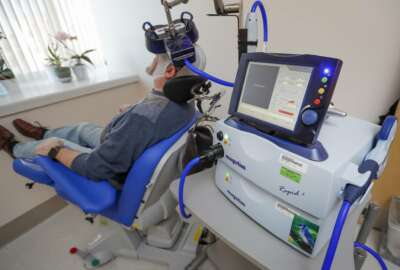
Post-traumatic stress disorder also occurs in the intelligence community
Foreign intelligence officers, the nation's secret agents , often witness violence. Sometimes they face the threat or reality of violence themselves. They're also...
Best listening experience is on Chrome, Firefox or Safari. Subscribe to Federal Drive’s daily audio interviews on Apple Podcasts or PodcastOne.
Foreign intelligence officers, the nation’s secret agents , often witness violence. Sometimes they face the threat or reality of violence themselves. They’re also sworn to secrecy, even with their families. And they must remain neutral when discussing morally changing topics with politicians and their minions. It all adds up to the potential for mental health problems. To take a look at this issue that the intelligence community needs to do more to mitigate, Federal Drive host Tom Temin spoke with Heather Williams, a former intelligence official with several agencies and now a senior policy researcher at the RAND Corporation.
Interview transcript:
Tom Temin
And you did see and witness horrible things. So you speak from personal experience. Luckily, you seem to have recovered or gotten through it without too much, I guess, post traumatic stress disorder, or am I speaking incorrectly?Heather Williams
I don’t claim to have had the worst experiences I certainly know of colleagues who saw and heard a lot worse, though everyone experiences exposure to trauma differently. No, I feel that it’s allowed me to understand this issue at a very personal level.Tom Temin
Because the military and the VA have woken up to this issue in recent years, much more loudly than anybody else I haven’t heard much from the IC. So how does the IC deal with it at this point? And what could they do better? Do you feel?Heather Williams
Yes, I think there’s not sufficient awareness of this issue in the intelligence community. And there is a lot more that could be done. And there’s lessons that can be taken from what you mentioned, the military is doing. And also other professions like law enforcement or first responders, journalists, who have thought about this issue more over the years. So there’s programs in place that the IC, I believe, should be doing more to think about adapting those for what makes its environment unique.Tom Temin
And you in your training earlier in your career, the training involved, what? And did it include anything about warning as of what you might experience?Heather Williams
Certainly not that so that the training involved trying to equip me for a combat environment. So it was more about personal safety, brief medical training, how to use a weapon. And there was generally very limited training because I was a civilian. So even though there might have been times where I was put in a similar environment that a service member might have been, I certainly didn’t get the benefit of all of the training that they had. And there were sort of never a discussion and what I experienced about mental resilience, or the sort of possible traumatic exposure that you might get in the course of the job. And the training I’m talking about is specific to deployment, there’s plenty of opportunities for exposure to trauma on the day to day job just sitting at your desk in D.C., and it was never discussed in those contexts.Tom Temin
And what sort of trauma could you have sitting at a desk in D.C.?Heather Williams
Well, the intelligence community is absorbing information, you know, they might be listening to feed on their headsets, you know, particularly if they’re working out of NSA, they might be looking at videos and pictures, but they’re, you know, reading material. And sometimes that can be very graphic descriptions of violent events. I don’t want to go into too many gory details. But I remember seeing pictures of body parts connected to cartels that might have been trying to intimidate individuals or related to terrorist operations that we were doing, and especially today, more of that material is going to be visual, and it’s very easy to get videos and images in a way that wouldn’t have been true 20 years ago.Tom Temin
And I guess it’s fair to say that in the situation overseas, where you were given that minimal training and so forth, that there is the threat that something could be happening an ambush or whatever or being taken hostage is ever present. And I imagine that kind of overtime is like a drip drip drip of trauma.Heather Williams
Certainly I used to run the airstrip out in Afghanistan and would remember plain clothes Afghans coming toward me on a motorbike and really hoping those were our guys that that was National Police and not Taliban coming to see if they could they could scoop me up. And I knew of colleagues who had had very close calls motorcades, me, caravans that they were supposed to be in that were then hit by IEDs. If they had been there, someone likely would have lost their life. So there were times where many of us even though we were civilians were very close.Tom Temin
We’re speaking with Heather Williams, she’s senior policy researcher at the RAND Corporation and former member of the intelligence community and you also work for the Transportation Security Administration. That’s another one where a TSA agent once told me what they find when they have to open luggage. And you wouldn’t believe it. What people put in luggage he said described a couple of things which I won’t name here. So you then headed up a RAND study of this issue of how to deal with that. Well, I’m calling it PTSD, but the trauma experienced by the IC people that operate in tough areas. What did the study look at and what conclusions did you reach?Heather Williams
The work that we did it ran looking at this problem was a very initial study and work that we initiated on our own because we saw a need to pay more attention to this issue. So it’s not an in depth study, because we haven’t been provided the resources for that from the government to look at exactly what can be done. But it walks through how this issue can affect intelligence professionals, the vocabulary to talk about, you know, what is PTSD? What is secondary stress, you know, what is the trauma in these contexts, because sometimes people are experiencing traumatic stress, but they don’t know how to describe it, they don’t recognize it for what it is. And we talk about the negative consequences and sometimes positive, but more frequently negative consequences for the workplace, for the intelligence community, for the government from that and talk through some of the options that could be taken to try to address the problem.Tom Temin
And some of those options might be what?Heather Williams
So one thing that could be done is just to look at the policies that exist for professionals to seek help to look at how you can reduce the stigma that would exist for an individual who might want help, but is concerned about the consequences of doing so. I think a lot of intelligence professionals don’t know what happens if they start asking questions, and at what point in time, it could jeopardize their security clearance and thus, their ability to hold their jobs. And so they don’t even ask the question. So if policies were more transparent and shared more proactively, then people wouldn’t have to feel like they’re incurring risk just by asking about how to get mental health assistance. So that’s just one option. But one of the things that we talked about in the paper is that it would be beneficial for the intelligence community to have more of a culture of mental wellness to treat mental wellness in some of the same ways that they treat physical wellness. And so to be more preventively minded, and I think it would be important to mention to you that the CIA is actually taking a good step here, just about a week ago, they appointed their first chief wellbeing officer, there are some positive steps happening, but I think it’s generally still behind from where we would hopefully be.Tom Temin
And military veterans have lots of apparatus that they can avail themselves of there is the VA itself, which has a lot of mechanisms. There are veterans service organizations that are veterans groups from each of the different eras and nations recent history where they can get together in a safe environment, because the other people there have been through the same things. Is there anything like that for the intelligence community?Heather Williams
Not that I’m aware of, and nothing formal. And a lot of those programs that do exist either officially through the VA or nonprofit networks that are focused on assisting veterans, generally, civilians and contractors, which is another very large population in the intelligence community, they wouldn’t be eligible for those types of services. So you know, there’s a few professional organizations, you might have a chance to get together with some of your former colleagues and try to self medicate over a beer. That’s not the ideal course of action.Tom Temin
Sure. And just a quick detail on something that you wrote, you had a very fine essay in Politico recently, you said that among the things that you were trained for, as you mentioned, weapons handling and safety types of things, but also how to endure torture. How does one get trained for that?Heather Williams
Well, I had the opportunity to go to sere school, which your military listeners would be familiar with, but you are exposed to interrogation techniques, and given some rudimentary training about how you might respond to that I would still prefer not to be tortured. I’d like to not test how well that training might have stuck.Tom Temin
Yeah, I would last about four seconds. I think myself.
Copyright © 2025 Federal News Network. All rights reserved. This website is not intended for users located within the European Economic Area.
Tom Temin is host of the Federal Drive and has been providing insight on federal technology and management issues for more than 30 years.
Follow @tteminWFED




